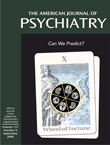Does Incomplete Recovery From First Lifetime Major Depressive Episode Herald a Chronic Course of Illness?
Abstract
OBJECTIVE: This study investigated the influence of incomplete recovery from first lifetime major depressive episodes on long-term outcome. METHOD: After their first lifetime major depressive episode, patients were divided into asymptomatic (N=70) and residual subthreshold depressive symptom (N=26) recovery groups and compared on longitudinal course during up to 12 years of prospective naturalistic follow-up. RESULTS: Patients with residual subthreshold depressive symptoms during recovery had significantly more severe and chronic future courses. Those with residual symptoms relapsed to major and minor depressive episodes faster and had more recurrences, shorter well intervals, and fewer symptom-free weeks during follow-up than asymptomatic patients. CONCLUSIONS: Resolution of major depressive episodes with residual subthreshold depressive symptoms, even the first lifetime episode, appears to be the first step of a more severe, relapsing, and chronic future course. When ongoing subthreshold symptoms continue after major depressive episodes, the illness is still active, and continued treatment is strongly recommended.



